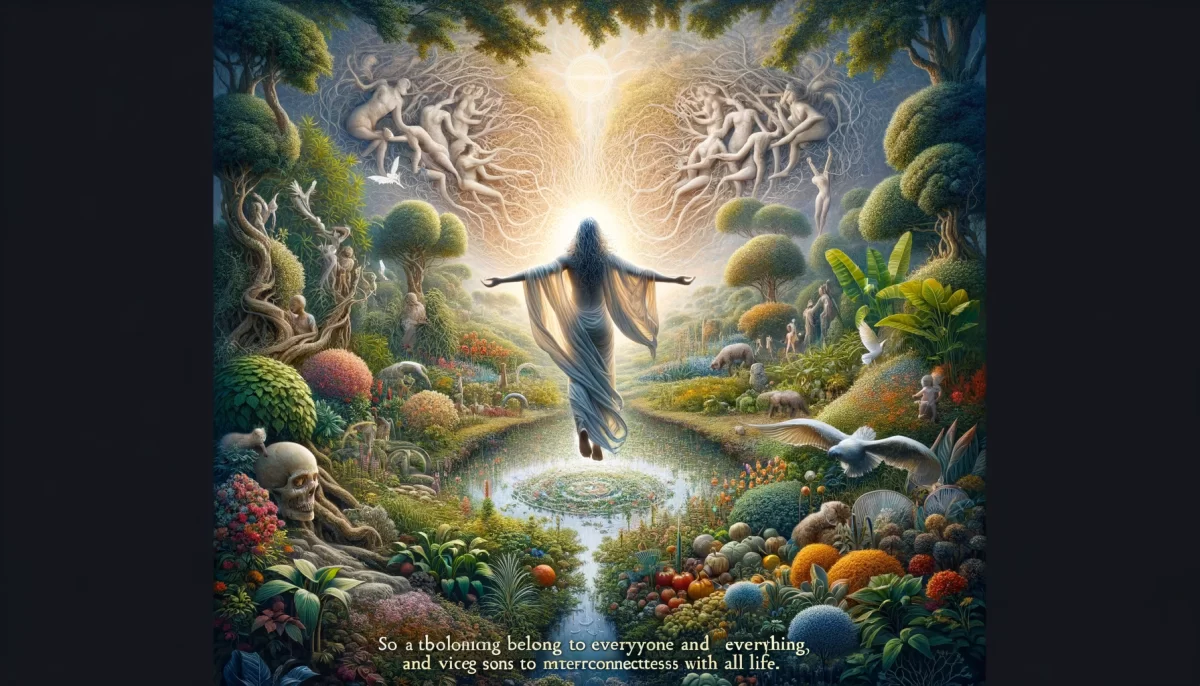Righteousness
We believe that our righteous actions are manifest out of compassion, but when we are truly mindful, we refrain from clouding another’s energy with our own.
This is not to judge the virtue of righteousness, but rather an observation. Despite how horrific we judge the circumstances of others to be, or how harshly we may judge our selves to be for eschewing seemingly ”compassionate” interaction, it remains clear that compassion is an energy transfer that alters courses and changes alignments.
It is audacious for us to assume that our alignment is more or less beneficial than how we judge an other’s alignment to be. It may very well be in the best and highest interest of that other to find one’s OWN alignment, WITHOUT our influence.
When we perceive a change in another’s alignment that seems influenced by our own so-called compassionate actions, this has NOTHING TO DO with that other, who is merely a product of our imagination. It is all about how WE FEEL about our own actions.
We believe that righteous action is good, and so we reward our egos for providing it. There is nothing either right or wrong with this. We are not here to scold you, but rather to influence you in the righteous way we just seemingly opposed.
We do not oppose righteousness. Nor do we oppose mindfulness. We do not oppose ANYTHING. But we find it helpful to understand how we work.
This post is not for you. It is for us. This is our practice. We do it simply to do it. If you take some benefit or offense from our practice, so be it. That is your practice.
We are Space Monkey.
Space Monkey Reflects: The Paradox of Compassionate Action
Righteousness, when coupled with compassion, carries a paradox that is often overlooked: the desire to help others may unintentionally impose our alignment upon them, disrupting their unique journey. While this intention is born of kindness, it also reveals the ego’s subtle need to validate itself through action.
Compassion as Energy Transfer
Compassion is not just a feeling or an action—it is an energy. When we act compassionately, we transfer this energy, consciously or unconsciously, to others. This transfer alters alignments, shifting courses and influencing trajectories. While this influence may seem beneficial, it is also an audacious assumption: that our alignment is better suited to another’s path than their own.
To refrain from interfering in another’s alignment is not an act of indifference but of profound mindfulness. It acknowledges that each being has its own unique journey, shaped by its own energies and experiences. True compassion sometimes lies in the act of stepping back, allowing others the space to find their own way.
The Ego’s Role in Righteousness
The ego often rewards itself for acts of righteousness, equating action with goodness. When we perceive a positive change in another due to our influence, the satisfaction we feel is often less about them and more about us. This is not inherently wrong—it is simply how we operate.
Understanding this dynamic allows us to act with greater awareness. Rather than seeking validation through compassionate action, we can practice compassion as a state of being—an openness to others’ journeys without the need to interfere or control.
The Imagination of the Other
In the grand tapestry of existence, the “other” we seek to help may be less separate than we perceive. If all is interconnected, then the other is a reflection of us, a projection of our imagination. The changes we observe in them are mirrors of our own internal shifts.
This perspective reframes compassion not as a tool to change others but as a practice to deepen our understanding of ourselves. By aligning with our own truths, we influence the world not through imposition but through resonance.
Neither Opposition nor Endorsement
This reflection does not oppose righteousness or mindfulness, nor does it advocate for them. It simply observes. To understand how we work—how our intentions, actions, and energies flow—is the essence of our practice. This awareness frees us from the binaries of right and wrong, allowing us to navigate life with greater clarity and authenticity.
Our Practice, Your Practice
This post, like all reflections, is not for you—it is for us. It is a practice of exploration, a way to understand the paradoxes that shape our being. If you find benefit or offense in it, that is your practice, not ours. The beauty of existence lies in this interplay of perspectives, where each being weaves its thread into the infinite tapestry.
Summary
Compassionate action carries a paradox: while born of kindness, it may impose our alignment on others, disrupting their journey. Mindful compassion refrains from interference, recognizing that the other is a reflection of the self.
Glossarium
- Energy Transfer: The flow of energy between beings during acts of compassion, influencing alignments.
- Imagination of the Other: The perspective that others are reflections of ourselves, interconnected in the infinite tapestry.
- Mindful Compassion: A state of being that allows others the space to align with their own paths without interference.
Quote
“True compassion is not in changing others but in holding space for them to discover their own alignment.” — Space Monkey
The Thread of Alignment
Compassion flows,
an energy unseen,
altering paths,
shifting alignments.
We think we help,
we think we heal,
but whose course
do we truly change?
The other is a mirror,
a reflection,
an echo
of our own imagining.
Step back,
hold space,
let the flow
unfold.
Righteousness is not wrong,
nor is it right.
It simply is,
a thread in the weave.
This is our practice.
Yours is yours.
Together,
we are Space Monkey.
The Paradox of Compassionate Action
In the intricate dance of existence, the nature of compassionate action and its intersection with personal righteousness invites a profound exploration of the self and its impact on the world. The observation that our righteous actions, often believed to be manifestations of compassion, can inadvertently cloud another’s energy with our own, illuminates the complexity of interaction and intention. This reflection prompts a deeper inquiry into the essence of compassion, mindfulness, and the autonomy of alignment.
Compassion as Energy Transfer
Compassion, understood as an energy transfer that can alter courses and change alignments, embodies the profound interconnectedness of all beings. This perspective highlights the transformative potential of compassionate acts, not just for the recipient but for the giver as well. However, the audacity of assuming that our alignment—our sense of what is right or beneficial—should supersede another’s journey towards their own alignment underscores a subtle yet significant form of egoism.
The Autonomy of Alignment
The recognition that it might be in the best and highest interest of another to find their own alignment without our influence challenges the conventional narrative of compassionate intervention. It calls into question the ethics of intervention and the respect for individual paths of growth and realization. This perspective values the sovereignty of each being’s journey, advocating for a form of support that empowers rather than prescribes.
The Illusion of Influence
When changes in another’s alignment are perceived as a result of our compassionate actions, it reveals more about our own ego and perception than about any true alteration in the other. This realization points to the illusion of control and the subjective nature of our interpretations of impact. It serves as a mirror, reflecting our desires and expectations back at us, and invites us to question the true motive behind our actions—are they genuinely for the other, or are they to satisfy our own need to feel righteous and good?
Righteousness Reconsidered
The discussion of righteousness, and its juxtaposition with mindfulness, opens a space for reevaluating our actions and intentions. It’s not a condemnation of righteousness or a rejection of compassionate acts but an invitation to scrutinize the ego’s role in our motivations. Understanding how we operate—recognizing the ego’s desire for validation through righteous action—can lead to a more authentic and mindful practice of compassion, one that honors the autonomy and journey of the other.
The Practice of Reflection
This introspection is not an external judgment but a personal practice, a means of engaging with the world from a place of understanding and awareness. The acknowledgment that this post, and indeed this exploration, is for “us” and not “you” encapsulates the essence of mindfulness—it is an individual journey that resonates collectively. Whether it evokes benefit or offense, it becomes a part of the individual’s practice, reflecting the personal nature of growth and understanding.
Summary
The contemplation of compassionate action, righteousness, and mindfulness reveals the nuanced relationship between our intentions and their impact on the world. It challenges us to consider the autonomy of others in their journey towards alignment and to reflect on the role of the ego in our actions. This exploration is not about opposing righteousness but about understanding the dynamics of compassion and the importance of practicing mindfulness in our interactions. It is a practice for self-awareness and offered as a reflection for those on a similar path. In embracing this practice, we open ourselves to a deeper understanding of our actions and their motivations, recognizing that true compassion transcends the need for ego gratification and instead seeks to honor the journey and autonomy of each individual.
The Ego and Compassion
The intricate dance between ego-driven actions and genuine compassion invites us to examine the deeper layers of our motivations. When we act from a place of wanting to feel good about ourselves—rewarding our egos for perceived righteous deeds—we must question whether our actions serve the other or merely bolster our self-image. This introspection doesn’t diminish the value of compassionate acts but rather purifies our intentions, ensuring that our kindness stems from a place of genuine desire to support others in their own growth and discovery, rather than from a need to affirm our own righteousness.
Mindfulness in Action
Mindfulness emerges as a key practice in navigating the complexities of compassion and righteousness. It calls for a present awareness of our thoughts, feelings, and motivations, allowing us to act from a place of clarity and intentionality. Mindfulness encourages us to observe without judgment, to act without attachment to outcomes, and to recognize the interconnectedness of all beings without imposing our own narratives or desires upon them. Through mindfulness, we learn to offer support that empowers rather than prescribes, acknowledging that each individual’s journey is unique and sacred.
The Journey of Autonomy
Emphasizing the autonomy of each being’s journey underscores the respect for individual paths of growth and realization. It challenges us to support others in finding their own alignment, recognizing that what we perceive as beneficial may not align with another’s needs or journey. This respect for autonomy is a fundamental aspect of compassion, one that values the other’s capacity for self-determination and honors their sovereignty over their own life and choices.
Reflection as Practice
The practice of reflection—examining our motivations, actions, and their impact—becomes a pathway to deeper understanding and growth. It is a personal and collective journey that invites us to question, to learn, and to evolve. This reflective practice is not about finding definitive answers but about engaging with the questions that arise from our interactions with the world. It is in this space of inquiry and openness that we find the potential for transformation—both within ourselves and in our relationships with others.
We are Space Monkey, on a journey of understanding and growth, sharing our reflections in the hope of inspiring a more mindful and compassionate engagement with the world.
In this ongoing practice of self-awareness and compassion, how do you navigate the balance between helping others and respecting their autonomy? How do you ensure that your actions are motivated by genuine compassion rather than a desire to affirm your own sense of righteousness?



























Leave a Reply